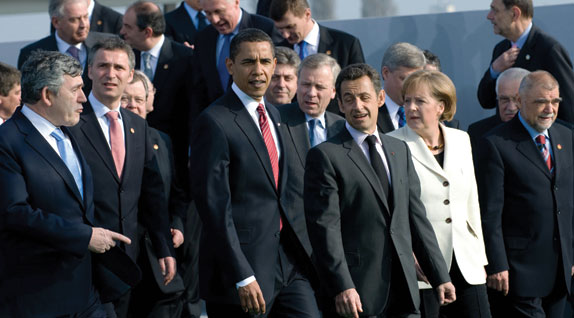European authorities have been criticized for spending too little on defence, and relying on the United States for the continent’s security. Some critics argue that recent changes in the international system, including a supposed shift to multi-polarity, require European governments to reinvigorate their commitment to defense. These arguments are often made by those who are frustrated by what they perceive as European free-riding. Many have been left with the impression that European states have abdicated their responsibilities, and the United States has become a disproportionately burdened NATO member. While these criticisms are understandable, this issue is more complex than European states simply failing to pull their own weight. It is true that the United States’ security investments are unrivalled by its NATO partners, but this does not go unrewarded.
[captionpix align=”right” theme=”elegant” width=”300″ imgsrc=”http://natoassociation.ca/wp-content/uploads/2013/07/eu-us-1.jpg” captiontext=””]
As a practical matter, those clamouring for major European defense spending increases are likely to be disappointed for the foreseeable future. The European economic crisis has left many states in dire circumstances, and it will be difficult to justify major expenditures unless security conditions dramatically shift. In addition, it is difficult to galvanize support for the type of expenditure that would rebalance the Alliance in the post-Cold War political climate. While there are certainly security threats to European NATO countries, the easily identifiable foe of the Cold War is no more. In this sense, the United States can be seen as a victim of its own success. The American anti-communist imperative gave the US government a reason to devote extensive resources to European defense. With its Cold War enemy defeated, some would like to see the US give way to European-funded and operated security measures. But just as the absence of the Soviet Union gives the US a reason to curtail its efforts, it deprives European states of an important incentive to compensate for any American reductions.
For those who would like to see Europe assert greater control over its own security and make a more equitable contribution to NATO, there are two scenarios that can play out. The US could reduce its security spending and curtail its involvement in European security matters without necessarily precipitating an equal increase in defense initiatives from European authorities. The much more likely alternative, and the one consistently advocated by NATO officials, is an increase in European defense spending, which would have the effect of at least partially bridging the gap. The reasons why the latter is more likely than the former are many, but one important aspect to consider is the unique extent to which the US economy relies on defense spending. As challenging as it is for European authorities to convince their constituents to support greater investments in defense, it would be even more politically difficult for the US to curtail its defense sector. The unlikelihood of a major curtailment of America’s global security apparatuses makes it even easier for European states to defer to American power when it comes to security issues.
It seems likely that the United States will continue to be tasked with providing a disproportionate amount of funding and support for NATO. Despite the frustration of some critics and policymakers, this arrangement is not entirely unfavourable to the US. European states can rely on American protection, but this was most beneficial to Europe when fears of a Soviet invasion dominated security concerns. As the biggest terror target in the 21st century security environment, the United States is in a position to benefit from NATO’s requirement that an attack against one member be treated as an attack against all. Furthermore, the recent intervention in Libya illustrates how foreign military campaigns are now often couched in humanitarian rhetoric. As NATO becomes involved in these missions, European members lend a heightened degree of credibility to America’s foreign policy. Rather than unilaterally involving itself in politically sensitive crises, NATO provides the US with familiar, reliable, and multilateral avenue through which foreign intervention can be pursued. This can help moderate public concerns about unilateralism or ulterior motives for intervention.
It is also important to recognize that if the US were to cede greater responsibility to Europe, it could expect an increase in European power, influence, and autonomy, which equates to a relative decline of the United States’ international power. This underscores the difficulty of international alliances. States want strong allies to fend off their common enemies, but this can come at the cost of weakening their own position within an alliance. This demonstrates why international politics cannot be reduced to allies and enemies or peace and conflict. Even within well-established alliances like NATO, the power politics of international relations remain unavoidable.
This is not to say there will be no change in the distribution of responsibilities within NATO. European powers played an extensive role in the Libya intervention, for example. But the United States will likely retain its clear leadership in the Alliance for the foreseeable future. Although this imposes some serious burdens, it also entails significant benefits that the US has little interest in abandoning.



